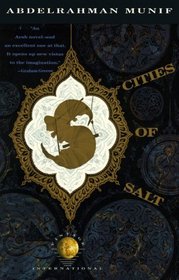CITIES OF SALT is a highly unusual novel because unlike most, its main character is not a human being, but a city, even a country or a culture. Like the great Mexican muralists, Rivera, Orozco, and Siqueiros, Munif paints the painful, colorful, and confused story of the transformation of a whole society---like Chinua Achebe of Nigeria, he shows what happened when "things fell apart". No single character is found in every chapter,the focus constantly changes,yet the direction remains clear. Peter Theroux faced an immense task, I believe, though I do not know Arabic. He either had to capture the flavor of a language that uses proverbs, quotations from the Qur'an, and indirect approaches to topics and risk English speakers' incomprehension ... or turn the Arabic into more familiar English dialogue, based on general meaning, and utterly destroy the special nature of the text. I would say he has done a fantastic job. You have the feeling of being in another world, where people express themselves in ways unlike North America/Britain/Australia in 2002. It is a convention of Western novels that speakers understand each other, but we know, in real life, that that is not so. Munif recognizes that, especially in a situation of rapid culture change, one speaker may not understand what another is saying at all.
When the word "colonialism" is mentioned, we usually think of Africa, of India or Southeast Asia, or of the Spanish invasions of Central and South America. Secondarily we may (or should) remember the Anglo-Saxon deeds in North America and Australia. Even if we narrow the focus to the Middle East, our "take" on colonialism there usually derives from the British or French occupation of former Turkish territories.
When the word "colonialism" is mentioned, we usually think of Africa, of India or Southeast Asia, or of the Spanish invasions of Central and South America. Secondarily we may (or should) remember the Anglo-Saxon deeds in North America and Australia. Even if we narrow the focus to the Middle East, our "take" on colonialism there usually derives from the British or French occupation of former Turkish territories.




